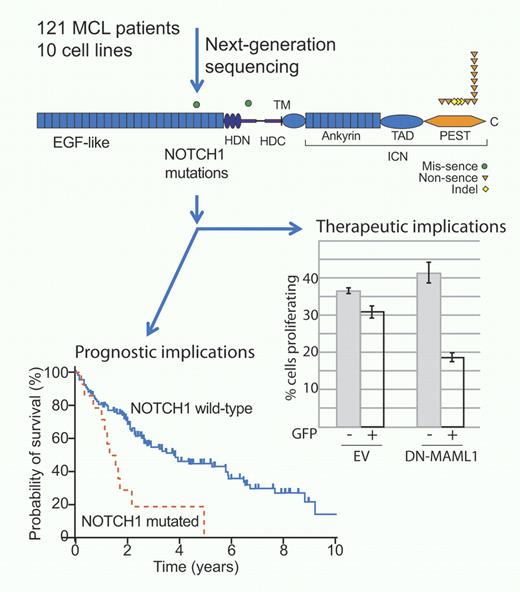In this issue of Blood, Kridel et al describe recurrent NOTCH1 mutations in mantle cell lymphoma (MCL) by next-generation sequencing of patient samples and cell lines. They further demonstrate a negative prognostic impact of NOTCH1 mutation in their cohort of patients and sensitivity of MCL cells to NOTCH1 inhibition in vitro, suggesting a novel role for NOTCH1 in this disease.1
Mantle cell lymphoma accounts for 6% of non-Hodgkin lymphomas and remains a challenging clinical problem, with median survival of patients being approximately 4 to 5 years.2 Cyclin D1 overexpression is found in the majority of MCL, but additional genetic lesions are needed for lymphomagenesis and continue to be characterized.
Kridel et al apply a powerful shotgun sequencing approach to discover novel pathogenic lesions in MCL. Along with mutations in genes anticipated to be involved in MCL pathogenesis such as TP53, ATM, and Cyclin D1, they found an unexpected result: recurrent NOTCH1 mutations were seen in 12% of patients (14/121) and 20% of cell lines (2/10) studied.
The NOTCH1 gene encodes a transmembrane protein that functions as a ligand-activated transcription factor.3 The NOTCH1 protein is cleaved by γ secretase inhibitors, allowing its active intracellular form to migrate to the nucleus and bind to cofactors, leading to transcription of downstream targets. Activating mutations in NOTCH1 have been best described in T-cell ALL4 and more recently in B-cell chronic lymphocytic leukemia.5 The majority of mutations found by Kridel and colleagues were in the PEST domain (see figure), which presumably lead to abnormally overactive NOTCH1 signaling because of impaired degradation of its active intracellular component.3
NOTCH1 mutations in MCL. Next-generation sequencing of MCL patient samples and cell lines reveals recurrent mutations in NOTCH1 with prognostic and therapeutic implications. Professional illustration by Paulette Dennis.
NOTCH1 mutations in MCL. Next-generation sequencing of MCL patient samples and cell lines reveals recurrent mutations in NOTCH1 with prognostic and therapeutic implications. Professional illustration by Paulette Dennis.
Furthermore, Kridel et al report an intriguing association between NOTCH1 mutation and shorter overall survival in MCL, suggesting a prognostic role for NOTCH1 in MCL. They go on to show that a subset of MCL cell lines may be sensitive to NOTCH1 inhibition, both by γ-secretase inhibition and transfection of a dominant negative NOTCH1 cofactor. Both these findings warrant further independent confirmation because of the heterogeneity of treatments in their patient cohort and the limited number of MCL cell lines in which NOTCH1 expression was linked to both mutation and sensitivity to its inhibition.
NOTCH1 is hypomethylated and overexpressed in primary MCL,6 but its role has not been explored in this disease. The findings of Kridel and colleagues demonstrate the power of next-generation sequencing to expand our understanding of tumor pathogenesis, and pave the way for future studies examining the prognostic and therapeutic implications for NOTCH1 signaling in MCL. Recent studies suggest that NOTCH1 mutations can have context-specific oncogenic or tumor-suppressor roles in human cancers,7 so the precise contribution of NOTCH1 mutations to the pathogenesis of MCL and other B-cell malignancies remains an interesting and open area for future investigation.
Conflict-of-interest disclosure: The author declares no competing financial interests. ■

